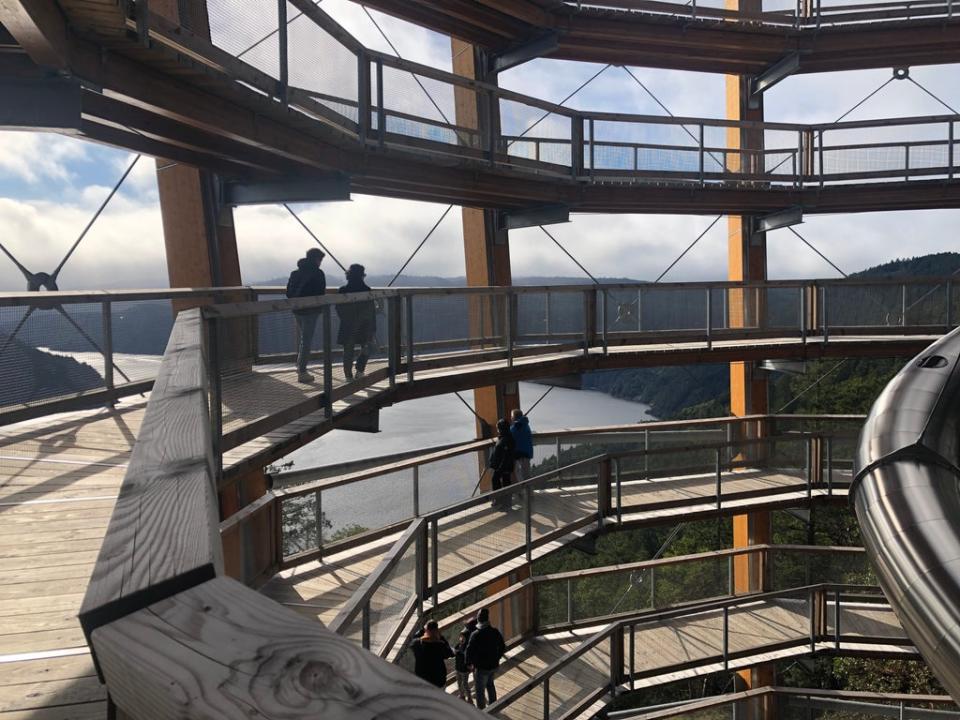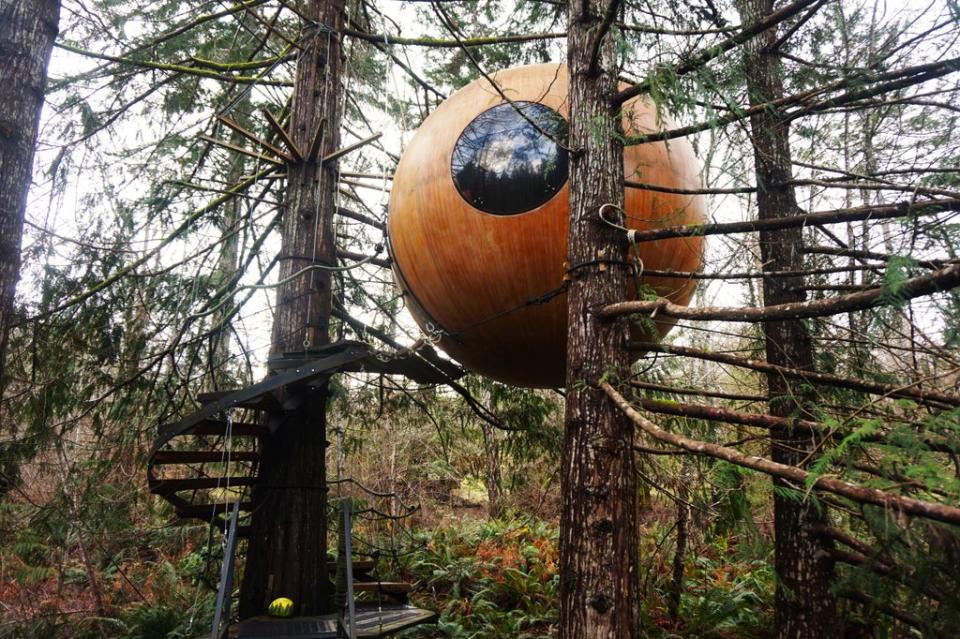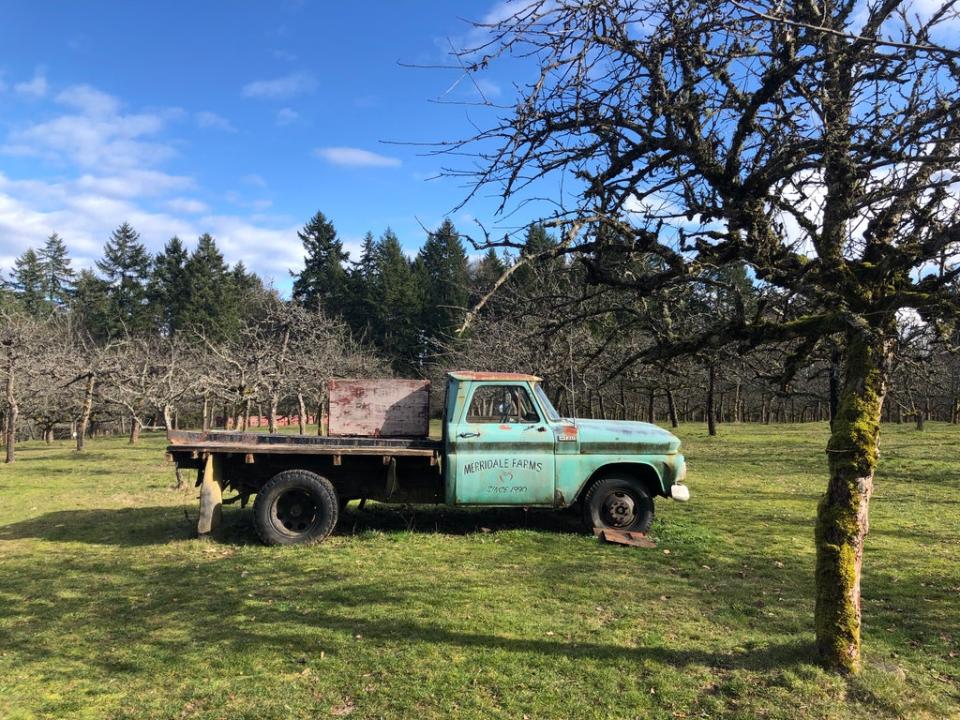Welcome to Vancouver Island – Canada’s green and pleasant land

Vancouver Island, on Canada’s west coast, is an elemental place where deep fjords pierce a lonely, jagged shoreline and clusters of old-growth rainforest collide with the tempestuous waves of the Pacific. Roughly the size of Taiwan, but with a population density akin to the Scottish Highlands, sustainability is part of the fabric here. Large tracts of the island are comprised of wilderness – and most people would like to keep it that way.
Here are half-a-dozen of the region’s greenest sights.
Forest skyscraper
The Malahat Skywalk is a unique spiral tree-walk that rises out of the forest 33km north of Victoria. Built on the traditional territory of the Malahat First Nation, who were partners in the project, it opened in 2021 as a place to absorb nature in an evergreen Pacific Northwest setting.

The 32m-high wood and glass structure looks like a giant cane basket poking above the forest canopy and is accessed by a gently graded walkway that curls up through 10 storeys to a circular lookout over forests, fjords, and mountains. There’s a tree-top “adventure net” you can walk across, and expansive views that stretch as far as Mt Baker, a 3,286m glaciated volcano in the US. To descend, retrace your steps on the walkway or catapult down a twisting helter skelter slide. Around the tower’s base, First Nations groups share storytelling and traditional drumming, and innovative eco-art made out of old driftwood embellishes the surrounding woods.
Spheres in the trees

Talk about communing directly with nature… Free Spirit Spheres – wooden, sphere-shaped pods suspended in the trees near Qualicum Beach – resemble huge eyes looking out over the forest. Designed as an extravagantly eccentric accommodation option by owner-inventor Tom Chudleigh, the curvaceous capsules are equipped with pull-down beds, cleverly crafted cabinets, mini-libraries, and spiral staircases leading down to independent outhouses. A ground-level facilities block sports a sauna, BBQ and high-quality showers. You’ll feel like you’re staying in a diminutive but deluxe caravan floating in a living ecosystem.
Mountain biking village
Cumberland, in the Comox Valley, is a former coal-mining settlement founded in the 1880s that was in danger of becoming a ghost town in the 1960s when the mines closed and its population almost evaporated. Reclassifying itself as a village, it was saved in the early 21st century by a group of foresighted residents who bought up tracts of biodiverse forest endangered by logging and built a web of 170 hiking and biking trails. It has since become one of Canada’s finest mountain-biking networks and its once downbeat main street of mining-era buildings has sprouted a cool array of independent shops and restaurants to support the influx of recreational tourists.

Pacific bike path
“ÊapscÌiik tÌasÌii” (pronounced ups-cheek ta-shee) isn’t your average long-distance bike trail. Running parallel to the wild shores of the Pacific Ocean for 40km, it was constructed between 2017 and 2022 in consultation with First Nations groups to link the two diminutive surf towns of Tofino and Ucluelet. With over 25km of the path bisecting the Pacific Rim national park, its building schedule was carefully organised around the migratory bird-nesting season. The unique name means “going in the right direction on the trail” in the indigenous Nuu-chah-nulth language.
Inaugurated in spring this year, the path provides easy access to rainforest walks, surfing beaches, First Nations sites and the wreck of a Second World War aeroplane. Unexpectedly, it even takes a novel two-wheeled detour through the lobby of Hotel Zed, a flamboyant retro 1970s-look accommodation that opened in 2020 near Tofino.
Agri-tourism in Cowichan Valley
Recently awarded the status of unique sub-GI wine-growing appellation, the Cowichan Valley is a fertile nugget of farmland in the island’s southeast corner that’s blessed with a Mediterranean-like climate and a long history of agriculture. Locals euphemistically call it “Canada’s Provence” or the “Napa Valley of the North”, though its crop-growing potential stretches way beyond its 14 wineries.

Herein lies Canada’s only tea farm, North America’s sole traditional balsamic vinegar maker, three cideries, numerous breweries, a lavender farm and several cheese makers.
Most of the 600 or so small farms in the area are engaged in community-supported agriculture (CSA), whereby consumers purchase seasonal produce from known local sources. Many farms and vineyards are also open to the public, making the region increasingly popular for agri-tourism. Merridale Cidery and Distillery offers tours, tastings, and food.
Trans-island trail
More than 12 years in the making, the Vancouver Island Trail is Canada’s newest long-distance hiking route. Conceived and built by a volunteer-run nonprofit, it contours the spine of Vancouver Island for 800km stretching from Victoria in the south to Cape Scott in the north. Over 90 per cent complete as of 2022, the trail incorporates myriad elements of Vancouver Island’s landscape and culture: ancient forests, shadowy mountains, logging roads, ghost mining camps, giant wooden railway trestles and the territories of nearly 50 First Nations groups.
Around a dozen people have so far completed the trail in its entirety and plenty more have partaken in shorter sections or day hikes. See the Vancouver Island Trail Association’s website for maps and details.
Travel essentials
Getting there
Trying to fly less?
Canada’s west coast is one of the harder destinations to reach flight-free. Intrepid travellers could catch a cargo ship from Liverpool to Nova Scotia, then cross the entirety of Canada by train: Halifax-Montreal, Montreal-Toronto, Toronto to Vancover.
Fine with flying?
WestJet, Air Canada and British Airways fly direct from London to Vancouver.

